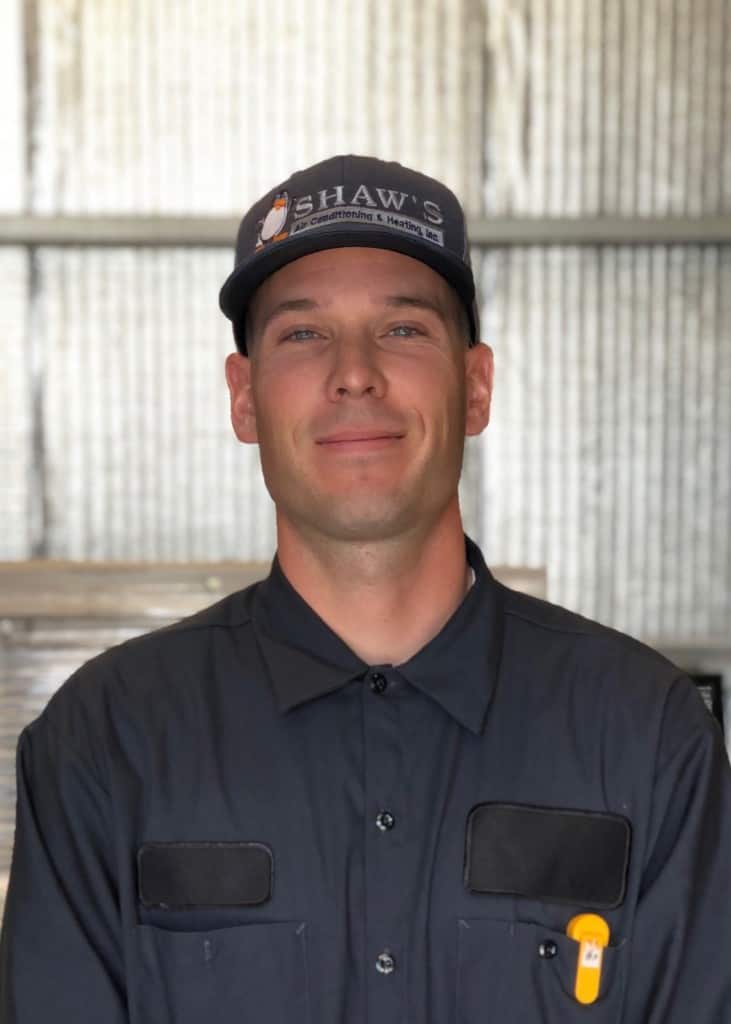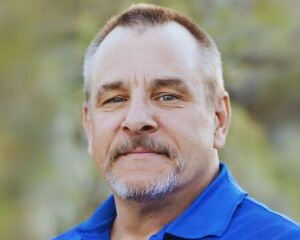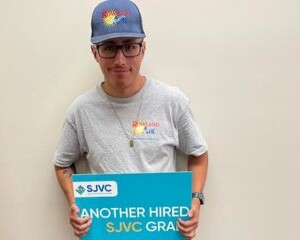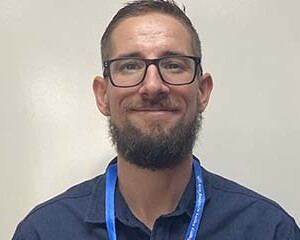Grad Q&A with HVAC-R graduate Jacob Hamilton
 The heat waves and cold snaps of the Central Valley generate plenty of work for those with specialized training in HVAC-R (Heating, Ventilation, Air Conditioning and Refrigeration).
The heat waves and cold snaps of the Central Valley generate plenty of work for those with specialized training in HVAC-R (Heating, Ventilation, Air Conditioning and Refrigeration).
But it was not just the comfortable income that attracted Jacob Hamilton to this line of work. He liked the skill set he would master and the variety of services he could provide. HVAC-R techs install, inspect, test, clean and maintain HVAC-R systems for homes and businesses. They discuss malfunctions with customers and recommend repair, replacement and maintenance.
What drew you to become a HVAC-R Technician?
I wanted to be outside, more hands-on, do something that allowed me to use my brain. I wanted something I could always do; something completely different from what I’d done in the past.
I have three Associate degrees. I’ve gone into nursing, thought about biology and being a veterinarian, but it wasn’t what I thought I wanted. I went down different paths and got stuck with school. None of it panned out. It got to a point where I had to get work. I was with Starbucks for about 10-years, and it worked out for what I needed.
How did you decide on the HVAC-R program on SJVC’s Visalia campus?
I looked at SJVC (Visalia) and (another school in Fresno) and I visited both campuses. I liked the instructor I met, Fernando Torres (HVAC-R faculty) on the Visalia campus, and he was very welcoming. The instructors there gave me good information when we met.
And I liked the layout at the Visalia campus’ (HVAC-R) shop better. The shop had a good amount of equipment and students were working when I went in there. It seemed a good fit for me.
How did you balance your home life, part-time job and school?
I tried to organize my day. I’m a morning person and instructors were nice enough to open up lessons or quizzes early on the computer so that I could do them before I went to work. Mr. Torres and Mr. Carrillo (faculty) were always helpful and available. When I would call, they would respond in a timely manner.
My wife (Abigail) has always encouraged me, supported me. She was always my biggest fan. We had talked about this, what it would take. She worked full-time as well. SJVC was a good program but was not necessarily inexpensive. But, without question, it was worth the sacrifices we both made.
What was the biggest challenge for you in the program?
Because it is an accelerated program, just staying organized and keeping up with what you were supposed to be doing was the biggest difficulty. But my family and wanting something better (for us) was inspiration to complete the program. I had no doubts at all.
You graduated a couple of months ago and are working full-time. What is it like?
I love this job (working for Shaw’s Air Conditioning & Heating) and it’s a great fit for me. I’ve been all over the Valley and get to see different cities. Each house is different, each (heating/cooling) unit is different. They can be a year old or 30-years old and have different types of refrigerants. A service call usually takes about an hour.
I like the challenges. I like letting people know what’s happening, making them happy.
What kinds of HVAC-R services do you provide?
On a typical call I’m responsible for checking the A/C unit for basic operations or performing maintenance. I might change out a capacitor, do a leak check on a system, check amp draws – what the motor is pulling through the wires – or replace filters or do minor repair work.
You don’t know what you’ve got until you get in there. It’s like a puzzle. One of the main reasons I wanted to go into this field is that I wanted to have a challenge. This takes thinking, organizing, a little bit of finesse.
Do you feel your HVAC-R program fully prepared you for this work?
Everyone I talk to is still learning. The people I work for are still learning, the instructors are still learning because there’s so much out there – new technology, new stuff being developed, so we transition what we know to something different.
I would say just go to (industry specific) college to learn about the industry and get the degree and EPA certifications.
What is the downside to your role in this industry?
The only thing I wasn’t prepared for is how small attics can be. In some attics I can stand and walk around and others there might be 3’ from top to bottom. I’m 6’ tall, so I don’t fit very well in them. You just adapt.
And it’s tough being in the attic when it’s 100 degrees out and the roof is 130. But you’re there to do a job and you have to get it done.
What kinds of advancement opportunities are available to you?
Right now, I’m at Tech I and can go up to Tech III. They (employer) have stuff lined up for me with different levels of expertise and pay raises. Over time I will start to have other responsibilities given to me. I will repair blower motors, coils, charge systems. I’ve had some training from SJVC, but it’s different from school when I have instructors right there, and now I’m by myself. But that’s the big thing – getting the experience you need in the real world.
A strong work ethic seems important in this line of work. Where did yours come from?
My dad, Scott, used to work for Edison. What he did was test water pumps for farmers, making sure they were running and working. He did that most of his life. My dad always told me ‘If you’re going to do something, do it right.’ He lived up to what he preached, and I’ve always admired my dad for that.
He’s told me he’s proud of me and where I’m at, and I’m very happy. In life there’s no exact right path, but you go with what you have.
What advice would you give to someone who is struggling with a path they’ve chosen, like education, to get to a more secure future?
Look at the long term because the short term can be stressful and give the illusion that it’s forever. You can get stuck in your own bubble and not see out of it. Talk to your instructors, your family, your friends. Get another perspective.
The biggest thing is making a decision and going for it. Mostly my thing is, don’t sit on the fence for too long. Make a decision and be happy with it.
Learn More About A Career In HVAC
Find out more about what an HVAC technician does, the education required to become a technician, HVAC salary possibilities and more facts you need to begin your HVAC technician training.
You might also like
More stories about
Request Information
All fields using an asterik (*) are required.


